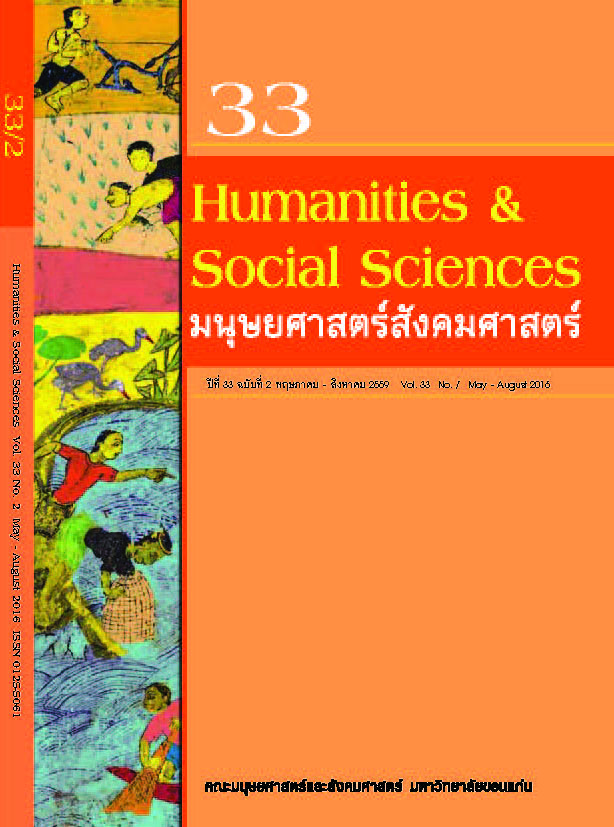การฟื้นฟูค่านิยมประชาธิปไตยชุมชน : กรณีศึกษาการใช้กลไกและกระบวนการของสภาองค์กรชุมชนตำบล
Keywords:
ประชาธิปไตยชุมชน, สภาองค์กรชุมชนตำบลAbstract
บทคัดย่อ
บทความวิจัยนี้มีจุดมุ่งหมายในการนำเสนอการก่อรูปและพัฒนาการของค่านิยมประชาธิปไตยในชุมชนตำบลเนินฆ้อ จ.ระยอง และแนวทางการฟื้นฟูค่านิยมประชาธิปไตยในชุมชนโดยอาศัยกลไกและกระบวนการของสภาองค์กรชุมชน โดยพบว่า ก่อนการเข้ามาของกลไกรัฐในการปกครองท้องที่ในปี พ.ศ. 2457 และ ชาวบ้านในชุมชนมีการใช้หลักของค่านิยมประชาธิปไตยมาเป็นฐานในการดำรงชีวิต คือ การปกครองตนเอง หรือที่ชาวบ้านเรียกว่า “ชาวบ้านอยู่กันเอง”
สำหรับการปกครองตนเองของชาวบ้านชุมชนเนินฆ้อจะเลือกผู้นำอาวุโสบนฐานคุณธรรมที่เรียกว่า “ระบบนายบ้าน” ผู้นำจึงเป็นผู้นำในการทำงานสาธารณะของชุมชนผ่านกระบวนการ “การปรึกษาหารือหรือการจับเข่าคุยกัน” และ อาศัยฉันทามติของคนในชุมชนเป็นตัวตัดสินใจในการทำงานอันเป็นหลักการของอธิปไตยของปวงชน ภายหลังการเข้ามาของรัฐไทยในรูปของการปกครองท้องที่ พ.ศ. 2457 กำนันและผู้ใหญ่บ้านของ ต.เนินฆ้อในเป็นผู้นำที่มาจากการเลือกตั้งของชาวบ้านในรูปแบบที่ไม่ซับซ้อน ผู้ที่ได้รับเลือกทำหน้าที่เป็นตัวแทนของชุมชนได้เป็นอย่างดีเนื่องจากเป็นผู้นำที่ตั้งอยู่บนฐานคุณธรรม
การสร้างค่านิยมแบบประชาธิปไตยของชุมชนเนินฆ้อได้เปลี่ยนรูปแบบไป แต่ยังคงรักษาร่องรอยของเนื้อหาปรากฏมาในรูปของวัฒนธรรมชุมชนและจิตอาสา ดังนั้น การพัฒนาประชาธิปไตยของชุมชนไทย จึงควรเริ่มจากพื้นฐานทางด้านวัฒนธรรมของชุมชนที่ยังคงร่องรอยเนื้อหาค่านิยมแบบประชาธิปไตยอยู่มาก การพัฒนาค่านิยมประชาธิปไตยของชุมชนในปัจจุบัน เป็นโอกาสที่ดีเนื่องจากมีการประกาศใช้พระราชบัญญัติสภาองค์กรชุมชน พ.ศ. 2551 โดยสภาองค์กรชุมชนตำบลที่จัดตั้งขึ้นตามพระราชบัญญัติดังกล่าวจะเป็นกลไกและกระบวนการที่ดีในการฟื้นฟูค่านิยมประชาธิปไตยของชุมชน สิ่งนี้เองที่จะเป็นฐานในการพัฒนาประชาธิปไตยและเสถียรภาพของสังคมไทยต่อไป
คำสำคัญ : ประชาธิปไตยชุมชน; สภาองค์กรชุมชนตำบล
Abstract
This article research aims to present the formation and development of democratic values in Nern Kor community, Rayong province, and guidelines for democratic value renewable in community by using the mechanism and procedures of community organization council. Before the entering of state mechanism, Local Government Act 1914 and municipal provincial system, democratic values which Nern Kor villagers applied as standard of living was self government, so-called live by themselves.
For self-government, villagers in Nern Kor community selected senior leader based on moral considerations, so called village chief system. Selected leader became the leader for public working via deliberative or negotiate procedure and consensus of villagers. These could be called that the foundation of public working of community was people sovereignty. After the promulgation of Local Government Act 1914, sub district headmen and village headmen were from the simple election and the elected representatives worked as community representative very well because moral principles were based of leaders especially at the beginning of law enforcement.
The formation of democratic values of Nern Kor community were changed but they still have signs of some content of democratic values which shown in form of community culture and public consciousness or public mind. So, democratic development of Thai community should start from cultural base of community which remained strongly kept some tracks of the democratic values. In the present time, the promulgation of community organization council act 2008 which established sub district community organization council is the great opportunity to develop community’s democratic values due to the fact that it will be mechanism and procedures for renewal community democratic values. This will be the basis of democratic development and stability of Thai Society.
Keyword : Community Democracy, Sub district Community Organization Council



